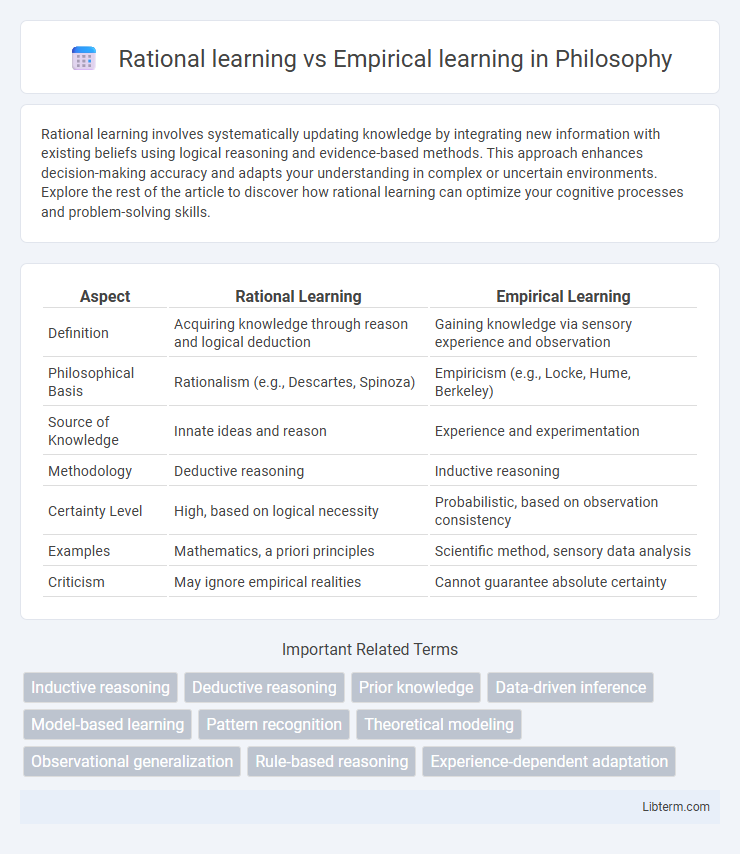Rational learning involves systematically updating knowledge by integrating new information with existing beliefs using logical reasoning and evidence-based methods. This approach enhances decision-making accuracy and adapts your understanding in complex or uncertain environments. Explore the rest of the article to discover how rational learning can optimize your cognitive processes and problem-solving skills.
Table of Comparison
| Aspect | Rational Learning | Empirical Learning |
|---|---|---|
| Definition | Acquiring knowledge through reason and logical deduction | Gaining knowledge via sensory experience and observation |
| Philosophical Basis | Rationalism (e.g., Descartes, Spinoza) | Empiricism (e.g., Locke, Hume, Berkeley) |
| Source of Knowledge | Innate ideas and reason | Experience and experimentation |
| Methodology | Deductive reasoning | Inductive reasoning |
| Certainty Level | High, based on logical necessity | Probabilistic, based on observation consistency |
| Examples | Mathematics, a priori principles | Scientific method, sensory data analysis |
| Criticism | May ignore empirical realities | Cannot guarantee absolute certainty |
Introduction to Rational and Empirical Learning
Rational learning relies on logical reasoning and innate knowledge structures to acquire information, emphasizing deduction and theoretical understanding. Empirical learning depends on sensory experience and observation, gathering data through experimentation and real-world interaction. Both approaches contribute to knowledge acquisition, with rational learning focusing on a priori insights and empirical learning grounded in a posteriori evidence.
Defining Rational Learning
Rational learning is defined as the process of acquiring knowledge through logical reasoning and systematic analysis, relying heavily on theoretical frameworks and prior knowledge to draw conclusions. It emphasizes the use of mental models, deduction, and hypothesis testing to understand complex phenomena without the need for extensive empirical data. This contrasts with empirical learning, which depends on observation, experimentation, and experience to build knowledge.
Understanding Empirical Learning
Empirical learning relies on direct observation, experimentation, and experience to acquire knowledge, emphasizing sensory data and evidence collected from the environment. This approach contrasts with rational learning, which depends on logical reasoning and innate ideas independent of sensory input. Empirical learning plays a crucial role in scientific methods, enabling continuous refinement of hypotheses based on real-world data and practical outcomes.
Key Differences Between Rational and Empirical Learning
Rational learning relies on reasoning, logic, and deduction from established principles, whereas empirical learning depends on observation, experimentation, and sensory experience to acquire knowledge. Rational learning emphasizes the use of innate ideas and a priori knowledge, while empirical learning is grounded in a posteriori evidence and data collection. Key differences include the source of knowledge, with rational learning prioritizing theoretical understanding and empirical learning focusing on practical, real-world validation.
Strengths of Rational Learning Approaches
Rational learning approaches excel in leveraging structured, rule-based reasoning to derive conclusions from existing knowledge, ensuring logical consistency and clarity in decision-making processes. These methods enable the formulation of generalizable principles that can be applied across diverse scenarios, enhancing predictive accuracy without relying solely on large datasets. Their strength lies in the ability to incorporate domain expertise and theoretical frameworks, facilitating robust problem-solving even in data-scarce environments.
Advantages of Empirical Learning Methods
Empirical learning methods leverage real-world data and observations, enabling models to adapt dynamically to complex and noisy environments where theoretical assumptions may fail. These methods excel in uncovering hidden patterns and correlations without relying on predefined rules, enhancing their accuracy and robustness in diverse applications such as machine learning and data-driven decision-making. The capacity to learn from experience and continuously update knowledge makes empirical learning advantageous in rapidly evolving domains.
Limitations of Rational and Empirical Learning
Rational learning is limited by its reliance on pre-existing knowledge and logical reasoning, which can lead to biased or incomplete conclusions when faced with novel or complex data. Empirical learning depends heavily on observational data, making it vulnerable to noise, measurement errors, and overfitting to specific datasets. Both approaches struggle with scalability and adaptability in dynamic environments where continuous learning and integration of diverse information sources are essential.
Examples and Applications in Real-World Contexts
Rational learning involves deriving knowledge through logical reasoning and theoretical models, as seen in the development of mathematical algorithms and formal logic systems used in artificial intelligence. Empirical learning relies on observation and experimentation, exemplified by machine learning techniques in data-driven applications such as image recognition and speech processing. In real-world contexts, rational learning guides scientific hypothesis formulation, while empirical learning powers adaptive systems like recommendation engines and predictive analytics.
Integrating Rational and Empirical Learning Strategies
Integrating rational and empirical learning strategies enhances cognitive flexibility by combining structured reasoning with experiential data analysis. Rational learning applies formal logic and theoretical models to predict outcomes, while empirical learning relies on observation and experimentation to validate hypotheses. Merging these approaches enables iterative refinement of knowledge, optimizing decision-making processes and improving adaptive behaviors in complex environments.
Future Trends in Learning Methodologies
Future trends in learning methodologies emphasize the integration of rational learning, which uses logical deduction and theoretical frameworks, with empirical learning, grounded in data-driven experimentation and real-world evidence. Advances in artificial intelligence and machine learning enable adaptive systems that combine these approaches to personalize education and optimize knowledge acquisition. Emerging technologies such as augmented reality and big data analytics further enhance the ability to blend rational insights with empirical validation for more effective learning outcomes.
Rational learning Infographic

 libterm.com
libterm.com